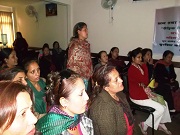UNI Nepal women fight against Workplace Harassments

|
UNI Nepal women Committee, together with the CLASS Nepal, organized an interaction program on the issues of workplace harassments on 30th November 2012 to mark the 16 days of activism against gender based violence. The theme of the program was "Let's speak out against workplace harassments against women workers" and aimed to create awareness on the gender based violence in workplace by discussing Nepalese laws and international instruments against gender based violence and other contemporary issues. 85 participants include working men and women from UNI Nepal affiliates representing different sectors such as commerce, finance, telecom, post and logistics, casino, security service, media, IT, hair and beauty, etc. The chief guest speaker was Ms. Vijaya Swar, Human Resource Manager from Nepal Agricultural Development Bank. Women working in different fields were present as guests. Ms. Babita Basnet, gender issue expert and journalist, and Mr. Tika Dhoj Khadka, a lawyer, were invited to present two thematic papers. There was a very interactive discussion on the probable workplace harassments and perpetrators etc. Some of the important discussions points were: ・ There are several types of violence against women. Physical, mental, sexual, and social violence can occur domestically as well as at workplaces. ・ There exists different laws and legal provisions to protect women against violence. These include the constitution, law regarding the employing women, labor act 2050 and laws promulgated especially for the violence against women. ・ The constitution states for legal punishment to the perpetrators of violence. There are also punishment provisions for humiliation and verbal abuses. ・ Although there are good legal protections against the gender based violence, they are not implemented effectively due to the lack of effective monitoring and implementation. Furthermore, legal protection is very limited as female employees often do not disclose workplace harassments issues due to various reasons. Discrimination is not an attitude that we are inherently born with, it is constructed and mold by the society. Although gender roles are changing, gender relation continues to be related to power, therefore working women need regular empowerment courses and education on their rights and legal protection. Exploitation of female employees by coworkers, managers, and bosses, continues to exists in workplaces despite lesser reported complaints. This decrease could be due to the social stigmas imposing responsibility on women for all the faults, causing women to hesitate and doubt their rights. Workplace harassment is a serious issue and should be addressed. All trade union members and the leaders should speak out against gender workplace harassments. |



